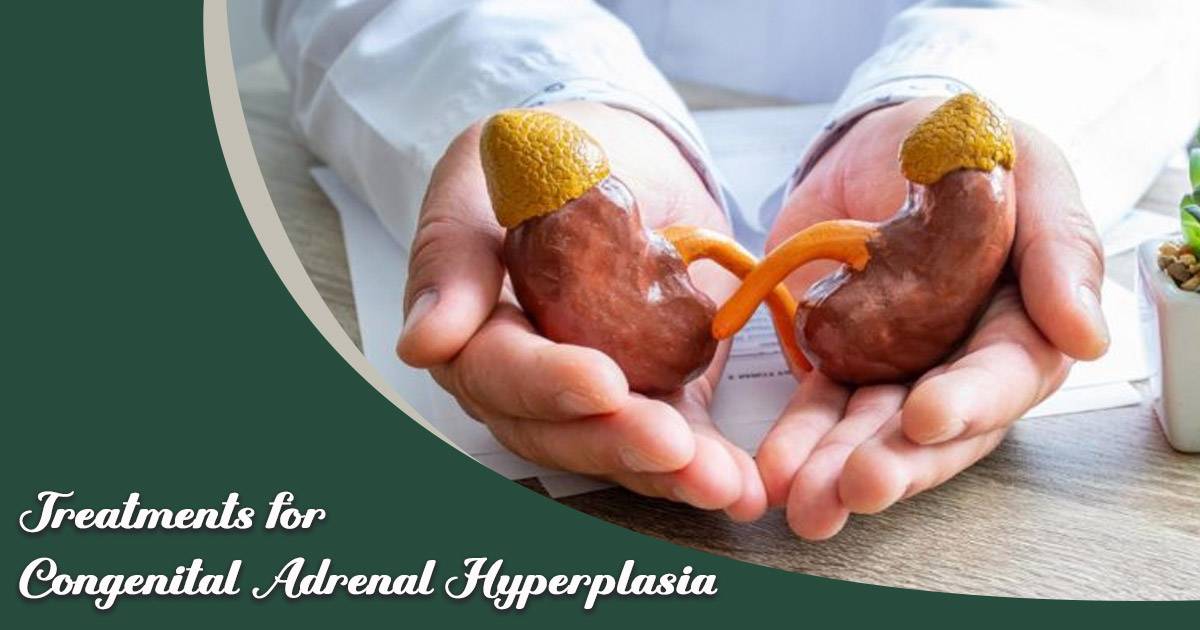Treatment Options for Congenital Adrenal Hyperplasia

Congenital adrenal hyperplasia (CAH) is a genetic condition affecting the adrenal glands, which produce essential hormones. This blog explores various aspects of CAH treatments, including medications, surgical options, and supportive care.
What is Congenital Adrenal Hyperplasia?
Congenital adrenal hyperplasia (CAH) refers to a group of genetic disorders that affect the adrenal glands, located just above the kidneys. These glands play a crucial role in producing hormones that regulate various functions in the body, such as metabolism, immune response, and blood pressure. When someone has CAH, their adrenal glands do not produce enough of certain hormones, leading to imbalances that can affect overall health and development.
Symptoms
CAH can present differently depending on whether it is Classic or Non-Classic:
Classic CAH: This form typically appears in infancy or early childhood and is more severe.
- Ambiguous genitalia in females: Female babies may be born with genitals that do not have typical female appearance.
- Rapid growth in childhood: Children with Classic CAH may grow faster than usual.
- Early onset of puberty: Signs of puberty, such as pubic hair growth and early menstruation, can occur sooner than expected.
- Salt wasting (dangerous electrolyte imbalance): This can lead to dehydration, low blood pressure, and other serious health problems.
Non-Classic CAH: Symptoms are milder and may not appear until later in life.
- Irregular menstrual periods in females: Women may experience irregular or absent periods.
- Excessive hair growth (hirsutism): Both men and women may develop excessive body and facial hair.
- Infertility issues: Fertility can be impaired in both males and females with Non-Classic CAH.
- Symptoms may appear later in life: Unlike Classic CAH, symptoms may not manifest until adolescence or adulthood.
Causes
CAH is caused by genetic mutations that affect enzymes responsible for producing cortisol and aldosterone hormones in the adrenal glands. The most common enzyme deficiency in CAH is known as 21-hydroxylase deficiency. This deficiency disrupts the normal production of cortisol and aldosterone, leading to an excess of androgens (male hormones) in the body. These hormonal imbalances contribute to the characteristic symptoms of CAH.
Complications
Without proper treatment, CAH can lead to serious complications:
- Adrenal crisis: A life-threatening condition where severely low cortisol levels cause symptoms such as vomiting, dehydration, and shock.
- Long-term complications: These may include infertility, osteoporosis (weak bones), and metabolic disorders that affect how the body uses energy.
Diagnosis
Diagnosing CAH typically involves genetic testing to identify specific mutations that cause enzyme deficiencies in the adrenal glands. Hormone level measurements, especially of cortisol and androgens, help confirm the diagnosis and determine the type and severity of CAH. Newborn screening tests can detect CAH early, allowing for prompt initiation of treatment to prevent complications.
Prenatal Testing
For families with a history of CAH or known genetic mutations, prenatal testing can be performed using procedures such as chorionic villus sampling (CVS) or amniocentesis. These tests analyze fetal cells to detect genetic abnormalities, including mutations that cause CAH. Early detection through prenatal testing enables healthcare providers to plan for appropriate medical interventions after birth.
Treatment
Managing CAH involves lifelong treatment aimed at correcting hormone imbalances and preventing complications. This comprehensive approach helps maintain normal growth, development, and overall health. Treatment strategies may include medication therapy, surgical interventions, and ongoing medical monitoring to adjust treatment as needed.
Medications
Medications are central to treating CAH:
- Glucocorticoids: Drugs like hydrocortisone or dexamethasone are used to replace deficient cortisol levels in the body.
- Mineralocorticoids: Medications such as fludrocortisone help regulate salt and water balance, which is crucial for maintaining blood pressure and electrolyte levels. Regular monitoring of hormone levels and adjusting medication doses are essential to ensure optimal hormone replacement therapy and minimize side effects.
Reconstructive Surgery
In severe cases of CAH, particularly in infants born with ambiguous genitalia, reconstructive surgery may be recommended. This surgical intervention aims to align physical appearance with gender identity and improve urinary and sexual function. The decision to undergo surgery is often made in collaboration with pediatric endocrinologists and surgeons, taking into account individual health needs and family preferences).
Mental Health Support
Living with CAH can present emotional and psychological challenges due to physical differences and ongoing medical management. Accessing mental health support services, such as counseling and peer support groups, can help individuals and families cope with the emotional impact of CAH. These resources provide valuable emotional support, education, and strategies to manage stress related to living with a chronic health condition.
Understanding Congenital Adrenal Hyperplasia Treatments
Effective management of congenital adrenal hyperplasia involves a multidisciplinary approach encompassing medications, surgical interventions, and psychological support. Early diagnosis and comprehensive treatment can significantly improve outcomes for individuals with CAH, enhancing their quality of life and minimizing health risks associated with the condition.
